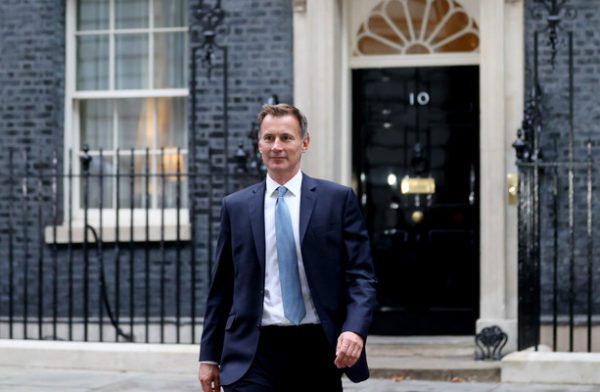The Autumn Statement will have a big impact on families and workers across the UK, from tax and minimum wage to energy bills and cost of living payments. Various changes affecting household budgets were announced by Jeremy Hunt yesterday (November 17th), with millions of workers set to hand over more of their hard-earned cash to the taxman.
In the current economic climate, the Government is looking to close an estimated £53bn gap in the UK’s finances, mainly through a series of increased taxes and changes to tax allowances.

Personal allowance, tax rates and tax bands
The Chancellor, Jeremy Hunt, has delivered his Autumn Statement setting out details of his proposed tax rises and spending cuts to raise £55bn to support the UK’s public finances.
Prime Minister Rishi Sunak said the Statement would “put our public finances on a sustainable trajectory” after the market turmoil that followed Liz Truss’s Mini Budget in September, which preceded her and former chancellor Kwasi Kwarteng’s resignation.
Despite the rumours, the Chancellor is keeping with the Conservative 2019 manifesto pledge not to raise the rates of income tax but instead has opted to increase taxes through ‘stealth’.
In a practice known as ‘fiscal drag’, this involves freezing the thresholds at which people start paying different rates of tax. Because of inflation and pay increases, people end up paying more tax because more of their income starts to fall within higher tax bands.
Threshold freezes
When Rishi Sunak was chancellor, he introduced a four-year freeze on the personal allowance, the level above which people start paying income tax, at £12,570 from April 2022 until 2025/26.
The threshold for higher-rate income tax in England, Wales and Northern Ireland, when people start paying 40% instead of the standard 20% rate, was frozen at £50,270 over the same period. The higher rate was also frozen at £150,000.
This freeze has now been extended by two years to 2027/28 which will mean many more people will be dragged into higher income tax bands. Also, in a complete U-turn on Kwasi Kwarteng’s plan to scrap the Additional Rate of income tax, Jeremy Hunt has now reduced the threshold for the highest 45p rate from £150,000 to £125,140.
Inheritance tax
Mr Hunt has also extended the inheritance tax (IHT) freeze for another two years leaving the nil rate band at £325,000 and the residence nil rate band (RNRB) at £175,000. Married couples can pool their IHT allowances, meaning that potentially up to £1m can be passed to the next generation if a property is involved in the transfer.
Dividend tax allowance
You only have to pay tax if your dividends exceed the dividend tax allowance in the tax year which is presently £2,000. However, you don’t pay tax on dividends from shares in an ISA.
The dividend allowance will be cut from £2,000 to £1,000 next year and then to £500 from April 2024. The tax you pay depends on your income band – please note, you must add your dividend income to any other taxable income to determine the rate of tax you will pay.
The reduction in the allowance to £1,000 will mean basic rate taxpayers will end up paying £87.50 more in tax, higher rate taxpayers will pay £337.50 more, and additional rate taxpayers will pay £393.50 more.
Capital Gains Tax (CGT)
Mr Hunt announced the Annual Exempt Amount for capital gains tax will be cut from £12,300 to £6,000 next year and then to £3,000 from April 2024.
Above this, CGT will continue to be paid at 10% (18% for second properties or buy to let) if the chargeable gain fell within an individual’s basic rate band. Any gain that is above an individual’s basic rate band will be charged at 20% (28% for second properties or buy to let).
State Pension and the triple lock
There was no change to the freeze of the pensions Lifetime Allowance, therefore remaining at £1,073,000 until 5 April 2026. Making regular pension contributions and steady investment returns may mean you breach the Lifetime Allowance before you retire.
By taking advice early, we can assess how best to accumulate assets for retirement in the most tax-efficient way, potentially utilising other allowances and alternative ways of investing where necessary.
The triple lock, where pensions rise by the higher of 2.5%, inflation or average earnings was suspended last year and was widely rumoured to be suspended once again.
However, in what some saw as a surprise announcement, the Chancellor has reinstated the triple lock and therefore the State Pension will now rise in line with inflation. This will be welcome news for many pensioners with the State Pension set to rise by 10.1% from April 2023.
PLEASE NOTE: Grosvenor Wealth Management Ltd is authorised and regulated by the Financial Conduct Authority. The Financial Conduct Authority do not regulate tax planning, estate planning, or wills. The value of investment can go down as well as up and you may not get back the original amount you invested. Tax treatment is dependent on individual circumstances and may be subject to change. Tax planning is not regulated by the Financial Conduct Authority. Grosvenor Wealth Management maintain political neutrality and views expressed should not be construed as bias towards or against any political organisation.
Contact Us Form
Please complete this form if you wish to send us your questions or if you would like to request a call back.
We look forward to speaking with you.
Recent GWM articles that may be of interest
ISA returns of the year
Making the most of your 2024/25 tax allowances Investing your money wisely is more than [...]
Investing isn’t a one-size-fits-all approach
Why timing the market could be holding you back Are you considering delaying your next [...]
Financial resolutions to boost your wealth this year
Taking a proactive approach to clarify your current financial standing The start of a new [...]
Financial planning for your children’s education
Education is one of the most significant and rewarding investments you can make for your [...]
Autumn Budget Statement 2024
How could the range of changes impact your wealth planning? The Autumn Budget Statement 2024 [...]
Who pays for long-term care?
Ensure you’re well-placed to fund any future care needs Many people prefer to avoid the [...]







